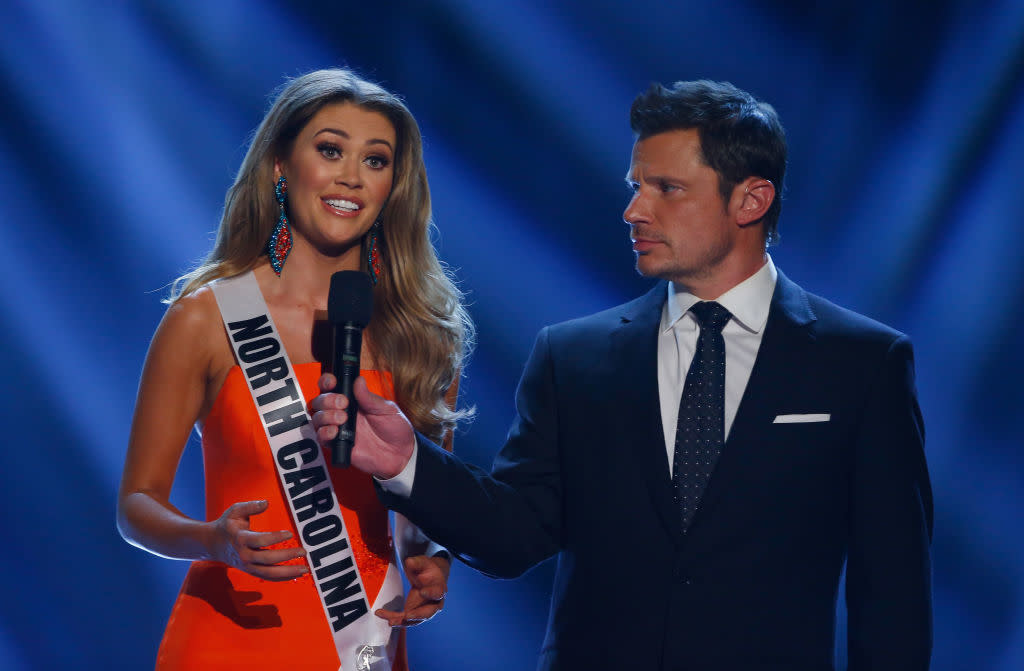How Miss USA 2018 contestants answered #MeToo, Boy Scouts, and other serious questions

Whether you’re a fan of the annual Miss USA Pageant or — like one USA Today writer — consider it a “cringeworthy, tone-deaf affair,” you’ve likely seen coverage of the infamous question portion of the event. As a more recent addition to the pageant, which itself dates back to 1952, it’s a segment in which the contestants must quickly and seamlessly transition from swimsuit model to de facto policy wonk, answering questions on topics ranging from national affairs to medicine in under 30 seconds.
Queries have included the following heavy hitters: What message would you send to global terrorists? Should the U.S. have universal health care? And should criminal suspects be subjected to a police DNA test after arrest?
These questions aren’t simple, even for the people who have dedicated their entire careers to answering them. So to ask them of women competing in a beauty-focused competition can sometimes feel like a setup for embarrassment. And in many cases, that’s the result. One of the most famous examples occurred in 2007 at Miss Teen USA, when Miss Teen South Carolina was asked why one-fifth of Americans couldn’t locate the U.S. on a world map and answered (or tried to) in a rambling, meaningless manifesto.
“I personally believe that U.S. Americans are unable to do so because, uh, some uh, people out there in our nation don’t have maps,” she said. “And uh, I believe that our education like such as in South Africa and uh, the Iraq, everywhere like such as, and, I believe that they should, our education over here in the U.S. should help the U.S., uh, or uh, should help South Africa and should help the Iraq and the Asian countries, so we will be able to build up our future. For our children.”
The video went viral, and the event is still used as a joke years later.
Trump discussing the Constitution sounds like Miss Teen South Carolina discussing education. https://t.co/54Rzqd8tdl
— Jeff Dufour (@dcdufour) October 20, 2016
Has she been studying diction and elocution with Miss Teen South Carolina to promote coding education for US Americans? https://t.co/vinepFoixx
— Karen MacLellan Palmer (@krnpalmer) September 26, 2017
This year, as in years prior, the questions were serious, but arguably more relevant to the women themselves. But some of the answers angered fans on Twitter, specifically when Miss Florida responded to the question about what should be done to tackle the problem of sexual assault on college campuses by saying there should be more “activities” for women to learn “self-defense.”
Umm I’m not sure about Florida’s answer. Self defense can’t be the only solution though…what about the men? #MissUSA pic.twitter.com/AlpuZsuvN3
— Makho Ndlovu (@makhondlovu) May 22, 2018
One of the most compelling questions came as a nod to the increasing number of protests that have taken place nationwide since Donald Trump became president. Seemingly inspired by that, the hosts asked the final three contestants: “You’re on the way to a march and someone hands you a blank sign and a marker. What do you put on your sign, and why?”
Both Miss Nebraska (Sarah Rose Summers, who was ultimately crowned Miss USA) and Miss North Carolina, Caelynn Miller-Keyes, gave replies that were a mix of vague and fairly compelling. “I say, ‘Speak Your Voice,’” said Summers. “Go, speak to people … communicate with them, listen to their views, also that is one thing in the United States that we really need to focus on, is listening to each other.”
“I would put on my sign, ‘Your Body, Your Rights,’” said Miller-Keyes. “As someone who was sexually assaulted, as someone who stood up and fought against my perpetrators, I am all about marching — for your body, for your rights. Nobody ever … has the right to touch you, to drug you, to do anything to sexually assault you or harass you — that’s never acceptable.”
Earlier in the competition, the hosts raised another big question, this one about the decision to allow girls to join the Boy Scouts of America. The question, according to a transcript in the Washington Post, was: “Do you feel this is a positive change, and do you think that there is value in single-gender organizations?” The answer from Miller-Keyes was a positive one.
“I think this is a great change. I think we are in a time in America where — not in America, we’re at a time in the whole world — where gender equality is a huge thing,” she said. “I believe in 10, 20 years from now, women and men are going to be complete equals, and we are making those steps right now with the Boy Scouts.”
Finally, the hosts asked a question about a statistic showing that one in four American children in the U.S. now lives in a single-parent household: “How has that affected our generation’s views on marriage and family?” Miss Nebraska’s answer was, fittingly, a winning one.
“I am so grateful to have grown up in a home with two parents. … And so I can’t personally relate to this. However, I do work in children’s hospitals as a certified child life specialist where I’m a liaison between the children and families and the medical team,” she said. “And I’ve seen single mothers at the bedside working remotely on their computers to stay by their children and support them, and I think that it just shows that children, no matter if it’s a boy or a girl, that they can do that.”
Read more from Yahoo Lifestyle:
Meghan Markle and Prince Harry make first public appearance as a married couple
Kensington Palace made a huge mistake in its royal wedding program
